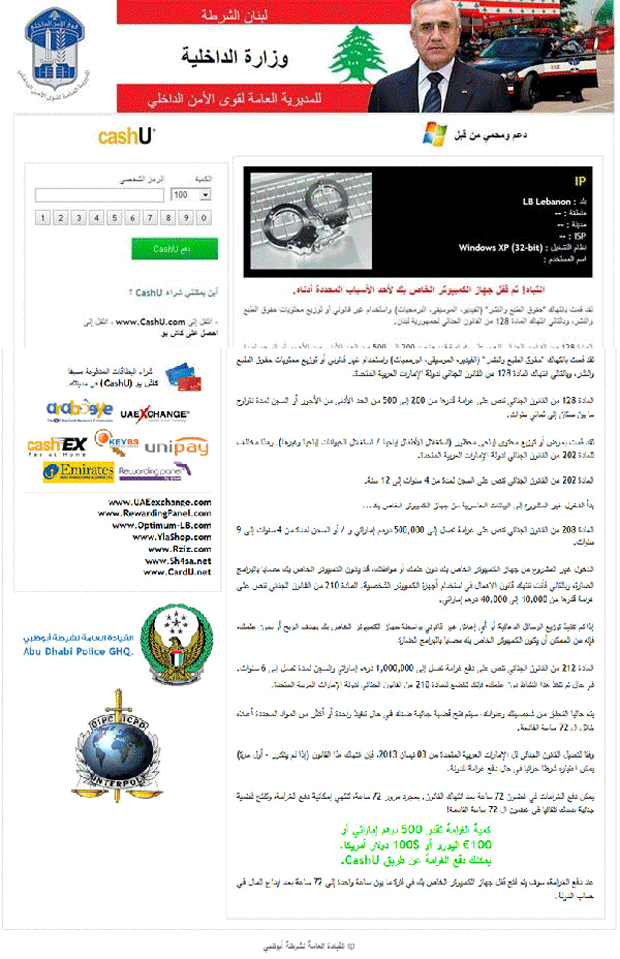Lebanon Police Ransomware
Threat Scorecard
EnigmaSoft Threat Scorecard
EnigmaSoft Threat Scorecards are assessment reports for different malware threats which have been collected and analyzed by our research team. EnigmaSoft Threat Scorecards evaluate and rank threats using several metrics including real-world and potential risk factors, trends, frequency, prevalence, and persistence. EnigmaSoft Threat Scorecards are updated regularly based on our research data and metrics and are useful for a wide range of computer users, from end users seeking solutions to remove malware from their systems to security experts analyzing threats.
EnigmaSoft Threat Scorecards display a variety of useful information, including:
Ranking: The ranking of a particular threat in EnigmaSoft’s Threat Database.
Severity Level: The determined severity level of an object, represented numerically, based on our risk modeling process and research, as explained in our Threat Assessment Criteria.
Infected Computers: The number of confirmed and suspected cases of a particular threat detected on infected computers as reported by SpyHunter.
See also Threat Assessment Criteria.
| Ranking: | 5,110 |
| Threat Level: | 10 % (Normal) |
| Infected Computers: | 3,071 |
| First Seen: | April 11, 2013 |
| Last Seen: | February 17, 2025 |
| OS(es) Affected: | Windows |

Lebanon Police Ransomware Image
The Lebanon Police Ransomware is one of many Police Ransomware Trojans that target computer users in countries in the Middle East. These Police Ransomware infections are characterized because they demand payment of a ransom through CashU, an online payment company that provides its services to customers in this region of the world. There is practically no difference between the Lebanon Police Ransomware Trojan and the many fake police notifications that are frequently alluded to as variants of the 'Ukash Virus'. These names simply refer to the preferred method for the ransom payment. Most Police Ransomware Trojans with European targets demand payment through Ukash while Police Ransomware Trojans targeting computer users in the United States tend to demand payment through MoneyPak.
The Lebanon Police Ransomware scam is simple: this malware infection locks the victim's computer, so it will display a fake notification from the Lebanese police force. This notification accuses the computer user of viewing forbidden pornographic material, distributing spam and various other computer crimes. The Lebanon Police Ransomware effectively takes the infected computer hostage, preventing the computer user from accessing their own files or the Windows Desktop. Instead of loading normally, the infected computer displays a fake message from the Lebanon police department claiming that it is necessary to pay a fine of one hundred Euros through the CashU money transfer service.
It is important to ignore the Lebanon Police Ransomware message, despite the fact that the Lebanon Police Ransomware uses some tricky tactics to scam its victims, such as using the victim's web cam to take video of the affected computer user and displaying a message in Arabic that includes official logos and emblems of the Lebanese Police Department. You should not send money to the criminals responsible for the Lebanon Police Ransomware infection, and if you already have, it may be possible to request a refund from the money transfer service used to make the payment. The first step to be taken in order to remove the Lebanon Police Ransomware is gain access to the locked computer. This can be done through an alternate start-up method, such as using Safe Mode or an external drive. Once you gain access to the infected computer, it is possible to remove the Lebanon Police Ransomware infection with the help of a reliable, fully updated anti-malware application.
URLs
Lebanon Police Ransomware may call the following URLs:
| findmanualsnow.com |

